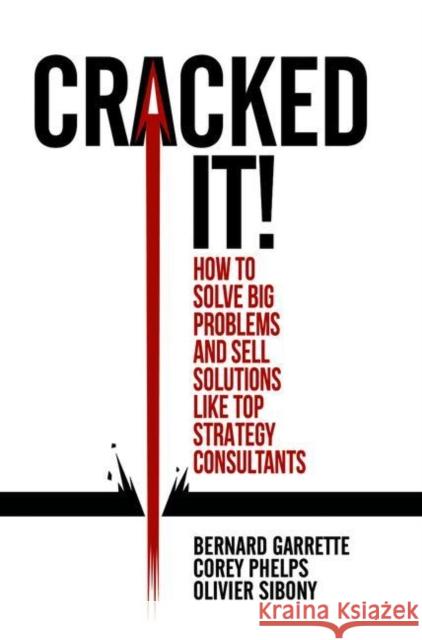Cracked It!: How to Solve Big Problems and Sell Solutions Like Top Strategy Consultants » książka



Cracked It!: How to Solve Big Problems and Sell Solutions Like Top Strategy Consultants
ISBN-13: 9783319893747 / Angielski / Twarda / 2018 / 284 str.
Cracked It!: How to Solve Big Problems and Sell Solutions Like Top Strategy Consultants
ISBN-13: 9783319893747 / Angielski / Twarda / 2018 / 284 str.
(netto: 111,65 VAT: 5%)
Najniższa cena z 30 dni: 115,63 zł
ok. 20 dni roboczych.
Darmowa dostawa!
Written in an engaging style by a trio of experts with decades of experience researching, teaching and consulting on complex business problems, this book will be an indispensable manual for anyone interested in creating value by helping their organizations crack the problems that matter most.
Chapter 1. The most important skill you never learned
· Fast and slow problem solving
· Problem solving and the expertise trap
· Complex problems and “unknown unknowns”
· The need for a disciplined problem solving process
· Chapter 1 in one page
Chapter 2. The five pitfalls of problem solving
· Case 1: When the music industry went out of tune
· Pitfall 1: Flawed problem definition
· Case 2: The Grameen-Danone strengthening yogurt
· Pitfall 2: Solution confirmation
· Case 3: The call center story
· Pitfall 3: Wrong framework
· Case 4: New strategy at J.C. Penney
· Pitfall 4: Narrow framing
· Case 5: A fat chance for sugar
· Pitfall 5: Miscommunication
· Chapter 2 in one page
Chapter 3. The 4S method
· Where does the 4S method come from?
· An overview of the 4S method
· State: A problem well posed is half-solved
· Structure: The architecture of problem solving
· Solve: Between analysis and creativity
· Sell: Choose the approach that suits your audience
· Chapter 3 in one page
Chapter 4. State the problem: the TOSCA framework
· Trouble: What makes this problem real and present?
· Owner: Whose problem is this?
· Success criteria: What will success look like, and when?
· Constraints: what limitations and trade-offs constrain the problem-solving process and the solution?
· Actors: who has a say in the way we solve this problem, and what do they want?
· Write the core question· Singing TOSCA as a choir
· Chapter 4 in one page
Chapter 5. Structure the problem: pyramids and trees
· Hypothesis-driven problem structuring
· Building a hypothesis pyramid· Hypothesis-driven problem structuring: pros and cons
· Issue-driven problem structuring
· Growing issue trees
· Growing a tree or building a pyramid?
· Chapter 5 in one page
Chapter 6. Structure the problem: analytical frameworks
· The power of frameworks: MECE breakdowns of generic problems
· The danger of frameworks: Frameworks as mental models
· Industry frameworks: value drivers
· Functional frameworks
· When all else fails, try good old logic
· Chapter 6 in one page
Chapter 7. Solve the problem: eight degrees of analysis
· From structuring to analyses
· Eight degrees of analysis
· Planning the work
· Conducting the analysis
· Chapter 7 in one page
Chapter 8. Redefine the problem: the design thinking path
· Design thinking, and when to use it
· Five phases, one mindset
· Phase 1: Empathize
· Phase 2: Define
· Chapter 8 in one page
Chapter 9. Structure and solve the problem using design thinking
· Phase 3: Ideate
· Phase 4: Prototype
· Phase 5: Test
· Chapter 9 in one page
Chapter 10. Sell the solution: core message and storyline
· Don’t tell the story of the search, tell the story of the solution
· The pyramid principle
· Pave the way for a dialogue· Design your “storyline”· Go for either a grouping or an argument· Chapter 10 in one pageChapter 11. Sell the solution: recommendation report and delivery
· Manage communications throughout the problem-solving process
· Beware the PowerPoint curse· Create an effective, modular report
· Develop the content pages
· Make quantitative charts relevant and simple· Use conceptual charts sparingly
· Trim the deck ruthlessly
· Quality control
· Beyond slide presentations
· Chapter 11 in one page
Chapter 12. The 4S method in action
· Case study: The Kangaroo opportunity· What is the problem?· Structuring the problem· Solving the problem· Selling the solution· Appendix: First section of a report on the Kangaroo case study
Chapter 13. Conclusion: Becoming a problem-solving master
Bernard Garrette is Professor of Strategy at HEC Paris. His teaching and research focus on corporate strategy, business simulations and problem solving. He served as MBA Associate Dean at HEC Paris, Corporate Strategy Expert with McKinsey & Company, and consultant or management educator for blue chip companies and start-ups.
Corey Phelps is Associate Professor of Strategy, Marcel Desautels Faculty Fellow and Associate Dean of Executive Education at the Desautels Faculty of Management, McGill University. He is a frequent keynote speaker, corporate trainer and consultant on topics of strategy and innovation.
Olivier Sibony is Affiliate Professor of Strategy at HEC Paris, where he teaches problem solving and strategic decision making. Previously, he was a Senior Partner of McKinsey & Company, where he spent 25 years advising the leaders of global corporations, and held a number of firm leadership roles.
1997-2024 DolnySlask.com Agencja Internetowa
KrainaKsiazek.PL - Księgarnia Internetowa









